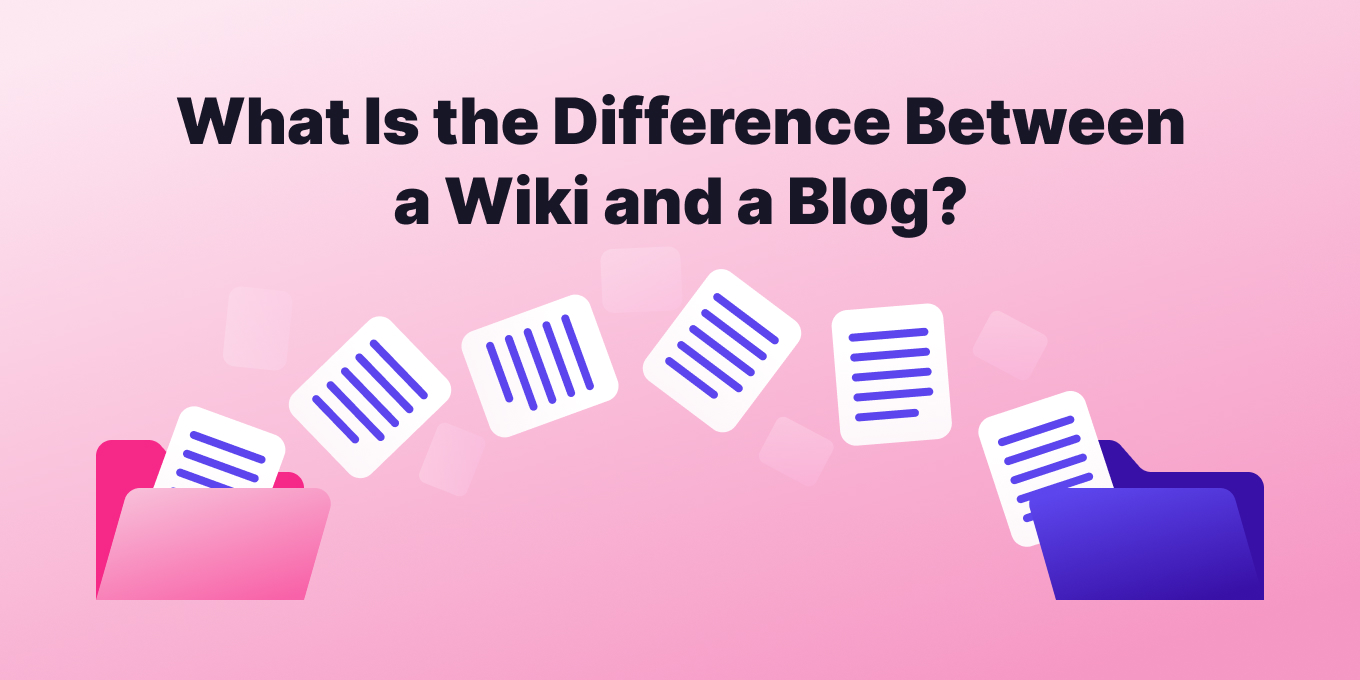It’s highly likely that your image of a “blog” and your image of a “wiki” share a similar space in your mind: both are a place you go to when you’re in need of new information or a deeper understanding about a certain topic, and both are a place where we can share knowledge.
Given that they share such familiar attributes, what is the difference between a wiki and a blog? While they both revolve around careful handling of information and good organizational principles, wikis and blogs can differ radically with respect to ownership, types of content, and management.
What Is the Difference Between a Wiki and a Blog?
One of the primary points of distinction when answering the question “what is the difference between a wiki and a blog?” concerns the way in which information is owned and supplied.

Ownership
Blogs are pretty much the property of one department in a business. It’s most likely that your marketing department will own your brand’s blog and operate it alongside other outreach initiatives. A specific set of individuals with skill sets tailored for writing and marketing will contribute articles to the blog. Contribution from the rest of your team will generally come in the form of providing subject-matter expertise if your bloggers are writing about their specific field. Updating and editing the blog falls to the authors/owners of the blog itself.
Wikis, on the other hand, are crowdsourced libraries of knowledge. As such, they are “owned” in equal measure by all of the collaborators who contribute. The responsibility of updating and editing the blog may be entrusted to a senior member of your organization (e.g., your head of HR), but, generally speaking, everyone has some duty to keep the company wiki tidy and up to date.

Content
Another primary differentiator of a wiki and a blog is the nature, form, and time-sensitivity of the content you tend to find on each of them.
Naturally, because blogs are outward-facing and built to attract attention to your business and product, the content you’ll write will be more responsive. While a good blog will often pull in information from other sources to shore up its credibility, you’ll often see content rife with opinions, or blogs created from a specific point of view. It is editorialized, meaning you can respond in real time to new events/developments/products, and include op-eds and other journalistic content.
A wiki, on the other hand, is generally intended for internal use and doesn’t benefit from editorialized content. It is intended to function without authorial voice, as a straight record of fact, delivered without comment. A useful wiki is one that is encyclopedic on the topics it contains.
In tone, while a blog tends to be more casual and approachable, wiki content is straightforward, informative, and often more formal. You can usually tell the stamp of a writer’s style when they’ve written a good blog post. Wiki entries, on the other hand, are more useful the more procedurally they’re written.

Management
Wikis and blogs also differ in how they’re managed. Taking the right approach to managing your wiki and your blog is the key to getting the most mileage out of each.
Blogs feature single, self-contained articles that must be tailored for SEO purposes. As a result, managing a blog requires coordinating the input of writers (who may or may not also act as content strategists, based on the size of your team) as well as editors and copy editors. The team sticks to a particular editorial process to manage a blog effectively.
Little modification needs to be made to content on a blog after publishing. You may decide to have articles refreshed down the line to boost their SEO performance, or you may choose to have them archived eventually. Either way, the main parts of managing a blog involve the stages before publishing.
Wikis, on the other hand, require continuous updating and maintenance to individual pages after publishing to account for new information on topics concerned. For instance, you may have set up wiki pages dealing with information on best practices, frequently encountered roadblocks in the sales funnel, and more. The information is there already, but as new information arises on these subjects (and other things, like processes and tech-stack manuals, strategies, etc.), you’ll need to make sure the entries are appropriately updated.
One similarity in managing both wikis and blogs is that they require assiduous interlinking of articles. For blogs, cross-linking of articles is a key part of an SEO strategy, and for wikis, linked entries make information visible and accessible and make the wiki more coherent as a whole.
Why a Business Needs Both a Blog and a Wiki
Both blogs and wikis represent invaluable assets for your company, a story told in straightforward numbers:
- Companies with a dedicated blog get 97% more links to their website than those that don’t.
- U.S. bloggers are projected to have a readership of 31.7 million through 2020.
Building a great blog takes time and amounts to an ongoing commitment — but the ROI can be phenomenal. Research suggests that “a company blog has more long-term ROI than traditional marketing efforts“, and “B2B marketers using blogs receive 67% more leads than those that don’t”.
Building a wiki for your own company is equally vital. It will invigorate your company’s internal knowledge reserves as much as your blog will put that knowledge to work bringing in sales. To ensure that your wiki is optimized to enable knowledge sharing in your company, note that:
- Internal wikis require management and oversight from your HR department but will be filled primarily by your broader staff.
- Wikis reduce the number (and repetition) of questions.
- Wikis can help eliminate departmental silos.
- Wikis allow for documents and process and strategy information to be stored in one universally accessible place. An internal wiki functions as a single source of truth.
- A wiki is an excellent way for your company to save money.
Neither a blog nor a wiki, if done right, is necessarily cheap in and of itself — and each becomes a heavier lift the better you want it to work. But, the fact is, both offer advantages that no other alternative can.
Making Your Knowledge Work
Wikis and blogs are perfectly complementary when mutually utilized by a business. Internal wiki solutions like Tettra make knowledge-sharing possible and are a foundational pillar of your company’s organizational strategy. Your blog, on the other hand, is the prime instrument for showing how broad that knowledge is and why it makes your company better than its competitors.
Now that you know the difference between a wiki and a blog, we’ll end by remarking on how they’re similar; they’re about getting the highest mileage out of your knowledge.
Whether that’s pooling your resources into an internal wiki or flexing your pedigree to potential customers through a blog, both kinds of knowledge-sharing tools can be great for building your company’s future.


